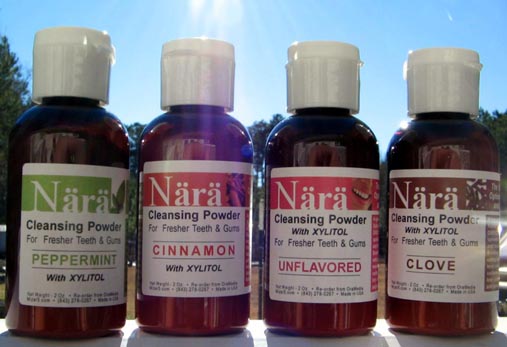Calcium vs. Sugar
Drs. Nara and Johansen
have their nutritional dos and don'ts,
too.
In order for the teeth to heal or remain healthy, Dr. Nara explained,
"A
person has to have sufficient calcium in his system so that the saliva
contains a fair amount of calcium. A person who is on an extremely
low-calcium diet would not get any remineralization, and the saliva
would not be such as to prevent decay."
Dr. Johansen cautioned against being lulled into thinking that
sugarless gum is really devoid of tooth-decaying sugar. "Sugarless gum
isn't sugarless. It' is sucroseless. If you look at the
label, you will see that it says, on most of them, 60 percent
carbohydrates. That can be just as bad as
sugar. The bacteria that cause decay can survive and multiply on those
carbohydrates."
And those bacteria are the reason why a good diet isn't quite
enough to keep your teeth in one piece - and in your mouth - for as
long as you
need them. You have to keep them clean. Unfortunately, as Dr.
Nara
commented, "Most people keep their underarms cleaner than their
mouths."
Dr. Johansen told us, "You have to keep after your teeth. I always
say to my male patients, just because you shaved yesterday doesn't mean
you
don't have to shave today. You have to keep at it every day. the main
thing
is to keep the bacteria from growing on the teeth. and that's done by
brushing. You should brush your teeth at least after brakfast and after
supper. You should brush right after you eat, too. and you should floss
your teeth once a day."
Dr. Nara has similar
advice. "You can't allow the bacteria to
become attached to the teeth. You have to keep them what we call 'free
floating.' That's done by using a brush to clean your teeth. It's a
matter of oral
cleanliness. You're not going to find healing in a mouth that's laden
with
plaque. Plaque is a combination of food particles and bacteria. If it's
on
the teeth too long, calcium precipitates out of the saliva and it gets
hard.
You can remove plaque from your teeth before it calcifies by simply
brushing.
Use the Right Brush
"You have to use the right kind of brush. A lot of people are
brushing with a cheap brush. You can go to the drugstore and pick up a
brush for
25 cents. A cheapie. A good brush these days is going to cost you at
least
a dollar. The reason a lot of people are not cleaning their teeth
better
is that they're using an inferior instrument. We start off by giving
them
a fairly soft brush, with rounded tips."
Finally, Dr. Knapp told us a little more about keeping the teeth
clean: "If you brush your teeth and you feel a tingling afterwards on
the gums,
that doesn't mean that you've gotten them extra clean. It means you may
have
damaged some cells. When you wash your arm, it doesn't tingle
afterwards,
does it? This is the sort of common sense thing that people don't think
about.
If you start to floss, you should do it correctly. Use unwaxed floss so
the floss will spread out. Use the floss like a shoeshine rag across
the teeth. Flossing and brushing should control plaque.
"Also, a lot of toothpaste has chemicals in it. I tell my
patients,
if you can't pronounce it, don't put it in your body. If you look at a
tube of toothpaste, you'll sometimes see artificial sugars listed, too.
These artificial
sugars have been shown in some studies to cause changes in the tissue
cells,
and to slow down healing as much as sugar can and possibly more. We
tell
them to avoid toothpaste - to use baking soda, salt or just plain
water."
By far, that was probably the most pleasant visit with a dentist
any of us has ever had, not to mention the most pleasant visit with three
dentists! Of course, these are three dentists practicing what appears
to
be a dentistry of the future, a dentistry that is concerned with healing
rather than drilling. Naturally, you don't have to wait until
your dentist becomes more interested in preventing tooth decay than
treating
it. They're your teeth! Take care of them and the dentistry of
the
future will be yours. Today.
Reprinted from PREVENTION, October, 1978


 Visual:
Visual:  Video:
Video: 